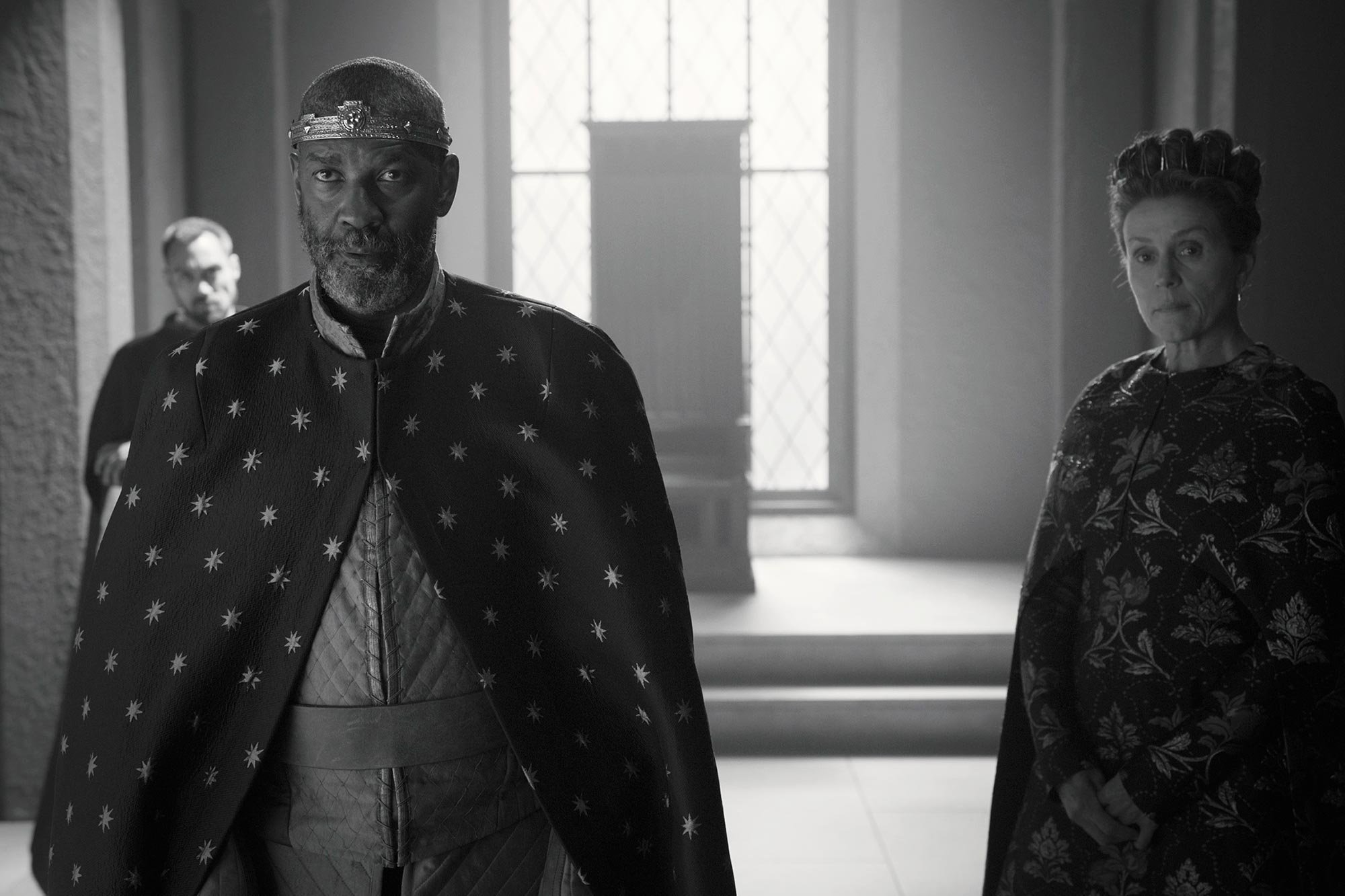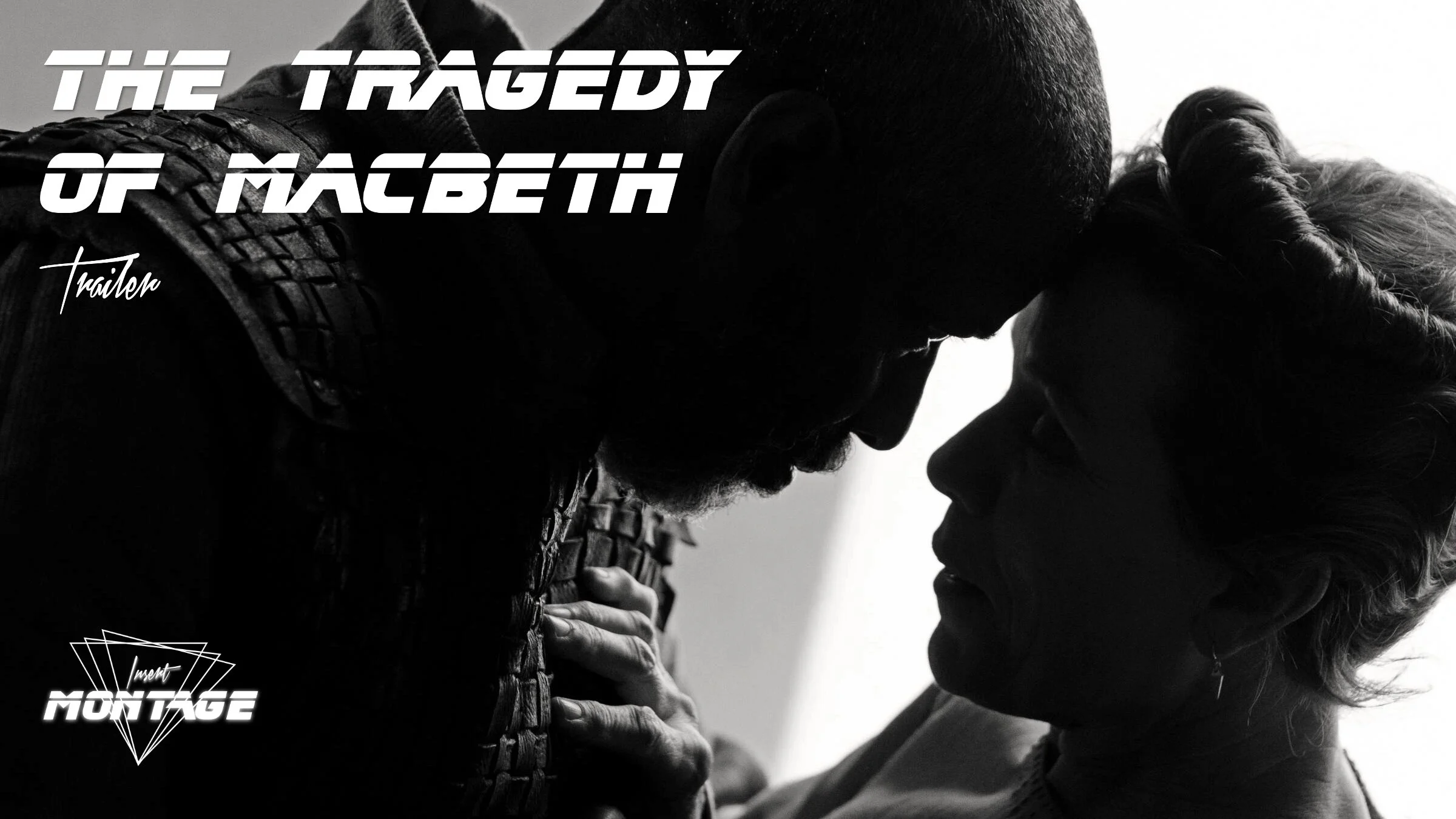THE TRAGEDY OF MACBETH
Sumptuous, surreal Shakespeare.
To date, there have been 30+ movie adaptations of William Shakespeare’s classic tale of witchy regicide. Trailing only Hamlet and Romeo and Juliet, Macbeth is undoubtedly one of the Bard’s most film-friendly pieces, with a story of power, ambition, and tragedy that has proved itself timeless.
Yet, despite these enduring qualities, any big screen Macbeth adaptation needs to bring something new to the table to stand out. While there certainly remains a place for your more strait-laced interpretation out there, we’ve now hit a point where a tale as well travelled as this must have something distinctive about it to cut through – and Joel Coen clearly knows this.
In terms of fundamentals, The Tragedy of Macbeth is relatively straight forward in its approach. With language and time setting very much as you were, there are at least initial worries that Joel Coen’s interpretation may play things too safe, yet it’s not long into the film before such fears are calmed.
True, the dialogue is every bit as dense as when Shakespeare wrote it four hundred years ago, however, move beyond this and there’s much to revel in here. Shot entirely in eerie black and white and cloaked in a murky haze, the film has an unnerving, surreal horror edge to it that darkens the play’s tone while injecting a creeping sense of impending doom that complements the source material perfectly.
Full of shrieking birds, thick fog, dark shadows, and off-kilter angles, Coen presents The Tragedy of Macbeth as a noir-ish fever dream that frequently feels like a German Expressionist fairy tale. Taking the traditional Scottish moors and placing them against this surrealist backdrop, the film marks itself out as something entirely unique and oddly contemporary, all while keeping one foot firmly planted in tradition.
Hinging on Bruno Delbonnel’s stunning cinematography, The Tragedy of Macbeth truly is something to behold. Presented in 4:3, every frame of the film is a piece of art, and while the visuals aren’t exactly expansive, the tightly cropped claustrophobia and sheer closeness of it all offers a distinctive, haunting beauty.
Within this oddly beautiful scenery, the film’s cast are impressive across the board, however, as one might expect, it’s the leads that really push Macbeth to the next level. Surrounded by impressive performances from the likes of Bertie Carvel, Alex Hassell, and Corey Hawkins, a solid foundation is laid, and a platform set for the film’s stars to shine. And shine they most certainly do.
Absolutely throwing themselves into two of Shakespeare’s most iconic characters, Denzel Washington and Frances McDormand fully immerse themselves in the roles and in the kind of complex dialogue that few but the very best are able to contend with. And make no mistake, this duo truly are two of the very best in the game, with their Lord and Lady Macbeth feeling like the moment both rubber-stamped their place among the acting elite.
Both as a pairing and as individuals, Denzel and McDormand bring something truly unique to the two classic characters, bending each one’s language and mannerisms to their own will. The result is an absolute acting masterclass that breathes new life into the 400-year-old source material and elevates Coen’s take on it to another level entirely.
This central pairing and the quality from the ensemble around them are absolutely crucial to the success of Joel Coen’s singular Shakespearean vision, as their electric conveyance of the material turns a potentially impenetrable, emotionally distant Macbeth into something unique and utterly absorbing.
Trimming the story back to its essentials, Coen streamlines Macbeth’s traditionally lengthy run time to a relatively swift 105 minutes, and the result is a lean, strikingly immediate viewing experience. Without losing any of the story’s essence, Coen does a miraculous job at giving us just what we need and not a minute more, and while some Shakespearean purists may scoff at such a dramatic reduction, it makes an otherwise avant-garde adaptation surprisingly approachable.
Despite this, however, The Tragedy of Macbeth will undoubtedly struggle to convert those inherently adverse to all things Shakespeare. While there’s certainly much about the film that warrants it being given a chance by doubters, it takes absolutely no prisoners with its dialogue, plunging us head-first into the Bard’s words, as sentences, soliloquies, and monologues fly by at a rate of knots.
As with anything Shakespeare, you’ll either click with the intricate, densely packed dialogue on offer here or you won’t. Although there’s certainly much more to The Tragedy of Macbeth’s appeal than its words, the film’s lack of compromise on this front will almost certainly be a turnoff for many.
Regardless, the film is unquestionably one of the most successful Macbeth adaptations to date, with an infinitely watchable, technically spectacular presentation that makes it the perfect entry point to Shakespeare’s work. Refreshing the source material without ever feeling forced, Joel Coen’s vision strikes a delicate balance between reverence and experimentation that should keep traditionalists happy while opening itself up to a wider audience.
With spellbinding visuals, a pair of powerhouse lead performances, and a condensed approach, The Tragedy of Macbeth is a surreal and sumptuously sparse triumph. Stripping the well-travelled story down to its essentials, Joel Coen steps away from his brother and outside his comfort zone to offer a haunting, otherworldly vision of blood and beauty that will slowly sink its dagger into your very soul.
The Tragedy of Macbeth is available to stream on AppleTV+ now.





